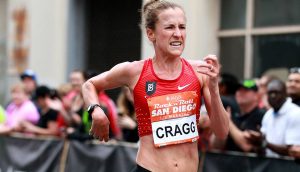Olympic marathoner Amy Cragg began her career as an accomplished long-distance runner, qualifying for the 2012 London Games in the 10,000 meters. But even by then, she was already focused on marathoning, making her debut in 2011 with a time of 2:27:03 -- the eighth fastest American finish of all time. She continued to push herself, placing first at the 2016 US Olympic Marathon Trials and taking ninth at the Summer Games in Rio. With marathon season undoubtedly in full swing — NYC city is showing all the signs with packs of runners crowding the streets on Saturday morning runs — Amy reminds us that camaraderie both in training and on race day is key. She also addresses the importance of strength and conditioning and how to tackle race day one step at a time. Lacing up for a marathon soon? Read on.
Accountability: Can you talk about training with a group or having a training partner?
Everyone has those days when they don't want to get out of bed and run, but when you have a team waiting for you, those days become fewer and farther between. People always say long distance running can be a lonely endeavor, but when you have a great team, it becomes one of the most social times of the day and the time when you feel most connected to others.
You never know what can happen on race day. How do you mentally prepare and get through hiccups on the course?
One step at a time! Unexpected bumps in the road almost always pop up on race day. Focus on the task at hand and one challenge at a time the same way you would tackle a marathon. Don't think about racing the entire marathon well, think about all the small things you can do well, one at a time, that will lead to a great marathon.
Do you have any key tips for setting the right pace?
Start off slower than you think is the right pace! The adrenaline of a race does amazing things, including making you go out faster than you thought was possible! Unfortunately, the adrenaline wears off but the fatigue from those first few miles doesn't. You can always make up for some slow miles in the beginning, later in the race, but going out a little bit too fast at the beginning can mean a lot slower in the later miles.
Strength and conditioning workouts are important for runners – especially to help avoid injury. Can you share an example of a workout you incorporate into your training plan?
I lift weights three days a week with the main purpose of them being to prevent injury. We focus a lot on core stabilization in order to prevent form breakdown while running, which can lead to injury. A great exercise for core stabilization are plank series exercises.
What’s your must-have gear for marathon training?
When I'm marathon training in Oregon, my main essential is a good jacket that is highly reflective. When I was in high school, my dad made me run in a giant orange crossing guard vest but I've gotten a serious upgrade since then. Check out the Nike flash -- stylish and very functional. Double runs often mean that at least one will be done in dark conditions, so it's important I'm always visible to cars.
What’s your go-to recovery after a long run?
My go-to recovery and one of my favorite things in the world after a long run is brunch. There is no better feeling than sitting down and replenishing my body with a good hearty meal after a grueling long run with my teammates. Everyone is happy and tired and the only thing left on the agenda for the day is to recover.
Do you have a bucket list marathon?
I completely bonked in the NYC Marathon and DNF'ed in Boston. Even though I have technically already done them, I feel like I can't cross them off the bucket list yet. So racing both of them WELL is on my bucket list.
What marathon are you signed up for?
MORE ON THE HOTSHOT BLOG
6 Warmups for Runners: Don't skimp out on stretching.
Carbs and Protein: 7 tips for proper intake for optimal fuel.
Running Tips: How to taper for race day.
Shalane Flanagan’s Road to Marathon: Read about the Olympians transition from track star to champion marathoner.

